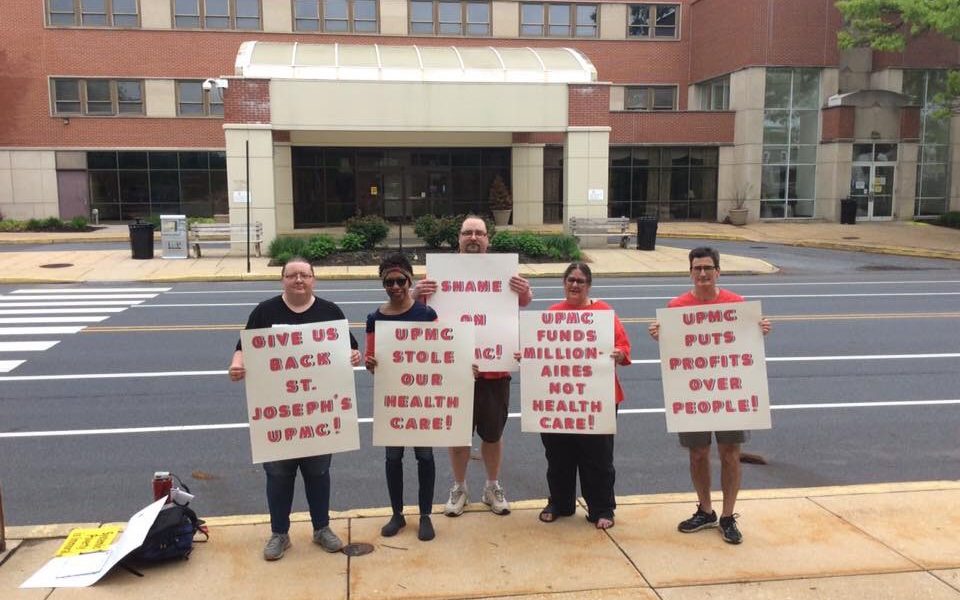For Immediate Release:
Contact: Tammy Rojas | 717-205-3230 | tammyrojas1977@gmail.com
Put People First! PA (PPF-PA) hosted a Virtual Town Hall and Rally on June 4, 2020 to discuss the impact that University of Pittsburgh Medical Center (UPMC) has on communities across Pennsylvania. Legally, UPMC is a “non-profit” charity, receiving tax breaks from the state of PA. However, PPF-PA’s analysis shows them to be a profiteer, in the sense that they take in more money than they pay out for costs (profit) and they use that money to pay their top executives and shareholders; as well as purchase more facilities to increase their market share, invest in the stock market, and lobby the state legislature through entities like the Hospital Association. UPMC acquired more than 20 PA hospitals between 2011 and 2018, and closed two of the eight hospitals closed in the state since the beginning of 2019.
PPF-PA members from across the state testified to the impact of hospital closings, and of the culture of rushed, inadequate care in UPMC hospitals. Jennina Gorman of the Altoona Healthcare Rights Committee recalled her experience when her then healthy 25-year-old fiance went to a UPMC hospital emergency room in Altoona with severe, debilitating stomach pain multiple times. He was never examined, but sent home each time with pain medication. Only when Ms. Gorman threatened to sue the hospital did they examine him and then rush him to emergency surgery for a severely infected gall bladder that had produced sepsis. ”I thought I might be his widow before I was ever his wife,” she remarked.
Gwennette Freeman of the Mon Valley Healthcare Rights Committee pointed out that because the hospitals UPMC closed in Braddock and Lancaster disproportionately served people of color, hospital closings are a racial justice issue. She connected them to the police killings, and noted that the looting that has occurred in some recent protests is small compared to the corporate looting by healthcare profiteers.
Others testified to poor care in UPMC hospitals and long waits in hospitals that remained in towns where UPMC had bought and then closed hospitals. Matthew Rosing of the Lancaster Healthcare Rights Committee testified that at Lancaster General Hospital, mental health patients have waited up to eighteen hours, following the closing of UPMC Pinnacle/St. Joseph’s hospital in 2019.
UPMC is a global corporation that reported a revenue of $20.6 billion in 2019. Based in Pittsburgh, they are increasingly taking over the for-profit healthcare industry in the state, and also have facilities in Maryland, Italy, Ireland and China. They are also planning to build new hospitals that will market to people from other countries with profitable specialty needs.
UPMC is the largest non-government employer in PA, and has a great deal of influence in the legislature. UPMC recently co-authored HB 2510 with PA House of Representatives Speaker Mike Turzai that will transfer $500 million dollars of Federal COVID19 funds into the hands of healthcare profiteers. The bill, which recently passed with a nearly unanimous vote in the House and Senate (notably State Representative Pam DeLissio voted against the bill) sets up a public/private financial authority that will fund “collaboratives” to operate assisted living residences, long-term care facilities and personal care homes. The term “collaborative” appears misleading. If the “collaborative” designates an action plan for a previously independent or publicly run facility there is nothing the facility can do to refuse. Thus the term “collaborative” seems to be a stand-in for consolidation or even monopolization.
The stated purpose of the bill is to “promote health and stabilize the economy of the region by directly supporting COVID-19 readiness and response in facilities.” What is not stated is what “promoting health and stabilizing the regional economies” really means. Would facilities be closed after the worst of COVID-19 is believed to have passed? Given UPMC’s track record of closing facilities, this is a real concern. Other unaddressed concerns include: if a facility is not profitable, will it be closed? And if so, will people be able to access care? Will it be affordable? To speaker Turzai it seems the most important thing is to get these funds into the hands of the private sector.
But this isn’t just about Republicans in the legislature. The nearly unanimous passage of this bill in the House and Senate shows that there is a bipartisan consensus about private profiteering in our healthcare system.
“Recently Harrisburg Democrats and their allies waged a campaign to get Speaker Turzai to resign over his cover-up of a COVID19 infection in the legislature. However when Turzai allows UMPC to write legislation of which they are a direct beneficiary, we don’t hear a peep,” remarked Nijmie Dzurinko, PPF-PA co-founder and co-coordinator.
“Most nursing home facilities in this state are run by private corporations and private equity managers connected to Wall St. They buy up hundreds of nursing homes, cut corners to make profit. Then ask for millions in tax money because they can’t deliver what they promised. The state is facilitating looting of $500 million to give to corporations,” she added.
Tammy Rojas of the Lancaster Healthcare Rights committee noted that Gov Wolf recently extended his emergency declaration regarding COVID-19, and that the declaration should be used to reopen closed hospitals, redirect personal protective equipment and test kits to hospitals, grant Medicaid to everyone in Pennsylvania, and bring hospitals and other public facilities under public control.
PPF-PA speakers emphasized the need to hold our elected officials accountable for facilitating healthcare profiteering at the people’s expense.
The Town Hall was attended by over three dozen people from 10 counties across PA, including staff from the offices of Representatives Austin Davis and Matt Bradford and Senator Art Haywood.
Put People First! PA invites all community members who have been impacted by UPMC and other healthcare profiteers to join us at www.putpeoplefirstpa.org
